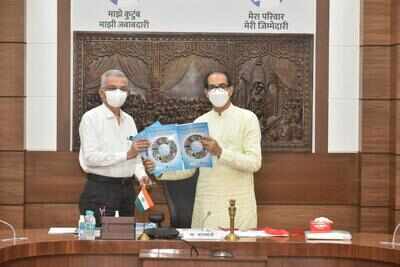- News
- City News
- nagpur News
- CM calls for budgetary support to Gene Bank

Thackeray released the gene bank reports prepared during the last 6-7 years of research on knowledge on crop genetic diversity, grasslands, freshwater aquatic native cow breeds, etc
Nagpur: Chief minister Uddhav Thackeray has asked to include the Maharashtra Gene Bank project, to be implemented by the Maharashtra State Biodiversity Board (MSBB), in the annual budget and make budgetary provisions for various biodiversity conservation projects in the state.
Thackeray was speaking while releasing the gene bank reports prepared during the last 6-7 years of research on traditional knowledge on crop genetic diversity, sponges, livestock, grasslands, freshwater aquatic native cow breeds, etc.
Funded by Rajiv Gandhi Science & Technology Commission (RGSTC), it is a collaborative work of the Indian Institute of Science Education & Research (IISER), Pune, National Institute of Oceanography (NIO), Goa, and National Centre for Cell Science (NCSS), Pune, Shivaji University, Kolhapur, & College of Fisheries, Ratnagiri, with the participation of 13 NGOs.
Releasing the various reports in the presence of a battery of officials and Dr Anil Kakodkar, chairman of RGSTC, Thackeray said, “To face the climate change challenges, it is pertinent to protect biodiversity may be crop, seeds, fish, livestock, grasslands, etc. The Maharashtra Gene Bank has prepared the ground and now we have to take it forward with the coordination of all. It will give a new direction.”
Over 30 NGOs and institutions like IISER have generated data on traditional knowledge on crop genetic diversity, sponges, livestock, grasslands, freshwater aquatic native cow breeds like Dangi, Lal Kandhari, Gaulau, and Sangamneri, besides Berari goat and Satpudi hen, for identifying superior animals for breeding purposes. Modern genetic tools were also used to identify the genetic relations between different breeds.
“We took special efforts to reach out to the people and community-based organizations (CBOs) at the grassroots, blending science and technology tools and scientific validation. Providing livelihood and nutrition benefits to marginal communities and creating field evidence and multi-institutional partnerships across the state,” says Dr VS Rao, project coordinator, IISER.
“In these 6-7 years, the project achieved significant contributions in biodiversity documentation and conservation, livelihood generation and sustainable utilization of resources in agricultural crops, native livestock breeds, grasslands, forest eco-restoration, management of forest produce, wild edible plants, freshwater, and marine ecosystem,” said Pravin Srivastava, member-secretary, MSBB.
Thackeray was speaking while releasing the gene bank reports prepared during the last 6-7 years of research on traditional knowledge on crop genetic diversity, sponges, livestock, grasslands, freshwater aquatic native cow breeds, etc.
Funded by Rajiv Gandhi Science & Technology Commission (RGSTC), it is a collaborative work of the Indian Institute of Science Education & Research (IISER), Pune, National Institute of Oceanography (NIO), Goa, and National Centre for Cell Science (NCSS), Pune, Shivaji University, Kolhapur, & College of Fisheries, Ratnagiri, with the participation of 13 NGOs.
Releasing the various reports in the presence of a battery of officials and Dr Anil Kakodkar, chairman of RGSTC, Thackeray said, “To face the climate change challenges, it is pertinent to protect biodiversity may be crop, seeds, fish, livestock, grasslands, etc. The Maharashtra Gene Bank has prepared the ground and now we have to take it forward with the coordination of all. It will give a new direction.”
“We will have to prepare concrete action plans to which extent we want to go. Norway has protected many rare seeds. In Britain, there is a museum of such biodiversity-protected species where many students and researchers pay visits for learning. We too need to work on the same lines,” said Thackeray.
Over 30 NGOs and institutions like IISER have generated data on traditional knowledge on crop genetic diversity, sponges, livestock, grasslands, freshwater aquatic native cow breeds like Dangi, Lal Kandhari, Gaulau, and Sangamneri, besides Berari goat and Satpudi hen, for identifying superior animals for breeding purposes. Modern genetic tools were also used to identify the genetic relations between different breeds.
“We took special efforts to reach out to the people and community-based organizations (CBOs) at the grassroots, blending science and technology tools and scientific validation. Providing livelihood and nutrition benefits to marginal communities and creating field evidence and multi-institutional partnerships across the state,” says Dr VS Rao, project coordinator, IISER.
“In these 6-7 years, the project achieved significant contributions in biodiversity documentation and conservation, livelihood generation and sustainable utilization of resources in agricultural crops, native livestock breeds, grasslands, forest eco-restoration, management of forest produce, wild edible plants, freshwater, and marine ecosystem,” said Pravin Srivastava, member-secretary, MSBB.
FacebookTwitterLinkedinEMail
Start a Conversation
end of article
Quick Links
Delhi Air PollutionDelhi TemperatureChennai WeatherBangalore TemperatureCovid vaccination centres in DelhiCoronavirus in DelhiRTPCR test in GurgaonHyderabad RainPollution level in BangaloreDelhi SmogDelhi TemperatureNoida AQIGurgaon AQI todayFire in MumbaiMumbai RainsCovid 19 RT PCR Test in NoidaDelhi AQI todaySrinagar encounter

